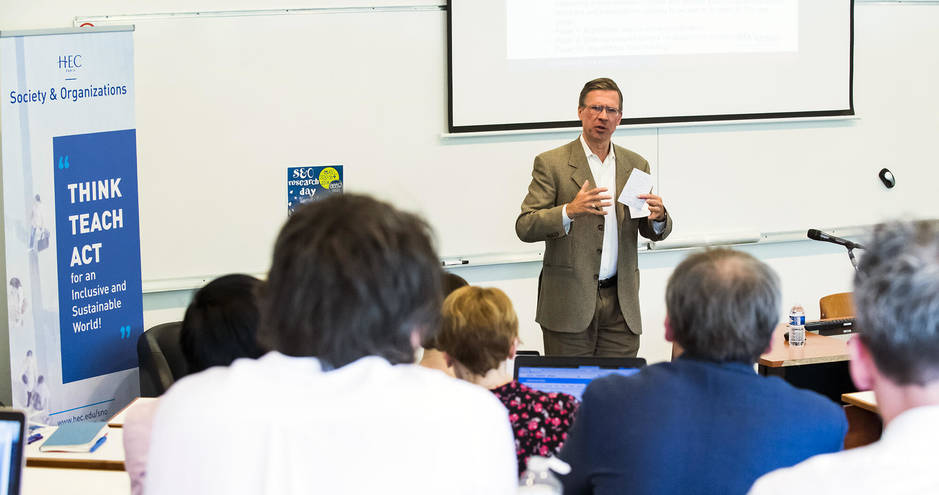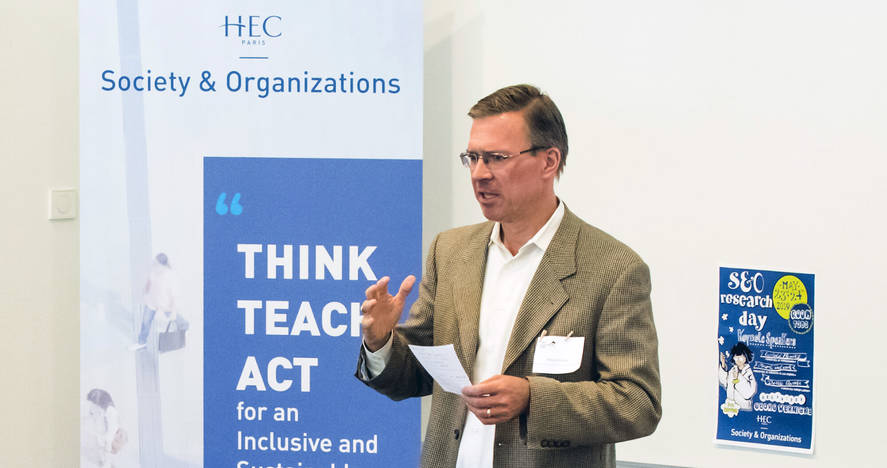Q&A with Witold Henisz: Exploiting Big Data for a Financial Revolution
Witold Henisz has been a key figure at The Wharton School for the past two decades. The Deloitte & Touche Professor of Management has been researching ways for corporations to find, build and maintain relationships with their external stakeholders.

Witold Henisz has amassed a remarkable amount of information ranging from government affairs to sustainability and community affairs which nourish his numerous publications. Henisz was invited by HEC’s Society & Organizations (S&O) Center as keynote speaker to its fifth S&O Research Day which took place on May 23-24.
Q: Your feelings about this S&O organized conference around their latest research?
WH: It’s always important to have these opportunities to interact with small groups of faculty members and doctoral students. We all share a common interest in topics related to the fields of business, CSR and stakeholder relationships. We are at different stages of our projects, some more advanced than others, and this is an opportunity to really engage with them deeply and profit from each other’s experience.
You were presenting a keynote speech at the HEC campus. What were the broad lines of your presentation?
A lot of my work focuses on structured text and media content analysis. I want to turn empirical research on stakeholders on its head: normally we study what companies are saying about what they are doing, I want to see what stakeholders are saying about companies. I think we are just at the tip of the iceberg in terms of using media content analysis on structured text - with Natural Language Processing, parsing and AI - to answer the big questions in management and social science. So, I’m making the case here that there should be more people involved in this field. We have a lot to learn, a lot to gain, from continuing to pursue this line of work.
Research on Both Sides of the Atlantic
As a professor of management at Wharton School you have been involved in this field for the past 21 years. How do you compare the American approach to this kind of research on stakeholders with what has been implemented at S&O?
Historically, there used to be differences in areas focusing on stakeholders’ and firms’ CSR policies. European models used to focus on values. There has been a shift in interest in the U.S. as there has been a realization that there is value in engaging with stakeholders. We’ve seen the center of gravity with a focus on CSR shifting from the Old Continent across the Atlantic to the U.S. We are starting to exploit big data in the States, demonstrating that it’s not just about pursuing your values, there is actually an alpha. We can deliver returns if we have access to the right data. That’s an exciting shift. We have a lot to learn from the 20-25 years of exploring these types of topics here in Europe. But there will be some cross-fertilization from the U.S. back to Europe as we demonstrate that business cases are using more advanced financial matrix.
Currently, your research is more focused on theoretical sides of finance which, as you say, involves more desk than field work. Why?
It’s all about leveraging points. I used to work with a number of mining and gas companies in Africa, going into the field to show top management that engaging with stakeholders in a more pro-active or deep manner is going to deliver value for them in the long-term. It does make a difference to a community: you see and understand the impact in these countries. But when you get Blackrock or State Street involved and talking about moving $13 trillion of capital into pressurizing companies into doing more, it’s just about leverage.
There is a lot of excitement in Wall Street at the moment. I just gave a keynote speech at a conference on Monday (Ed. May 20, at the third annual ESG Investing Forum in New York). It was looking at the environmental, social and governance factors in the financial sector and the new matrix and measurements. When so much entrepreneurship is occurring in ways to make an investment case and to attract new investors and pensions, I think that’s going to affect and change the order of things. I can affect companies in more sectors. I’m not just spending a week on the ground in Mali and making a difference, I’m affecting the entire mining sector. The same goes with the gas and oil sector and multiple industries round the world.
Short-term Capitalism Went too Far
The S&O center focuses on results beyond the bottom line: wellbeing, sustainability, stakeholders’ interest, transparency, fair pay, and so on. Are such priorities gaining ground in the American business community?
These topics are gaining ground, the question is how to best achieve these objectives. More and more people, especially amongst the millennials, really want to pursue issues that go beyond the bottom line. As the financial community recognize that it’s not in their long-term interest to pursue short-term goals, you get an alignment of interests. You no longer have to make this choice between values and value anymore. The best way to achieve large-scale social change is for financial sectors and shareholders to realize it’s in their own interest to adopt such policies.
For me I look at this in the local context, coming from Wharton School, its founder, Joseph Wharton, was a steel baron. He had made his fortune by pursuing monopolies. But in the 1890s, when he created the country’s first business school, there was a backlash against U.S. capitalism. And Wharton felt there was a real risk that the government could nationalize business because capitalism was so unpopular. He was part of a movement of progressive business leaders who wanted to demonstrate that business could solve these social problems incident to the civilization of the times. I believe business and finance have a role in this conversion. Now, it’s true that short-term balance sheets are not the right thing to focus on and we went too far in that regard. But as the financial sector tilts back, we can find an equilibrium that’s not setting one camp against the other but bringing the two back into an alignment.
Difficult Political Climate
Your university education is inter-disciplinary and includes degrees in political science. So you do categorize yourself as a social scientist. Do you find the balance you are seeking is echoing into the U.S. government these days?
It’s harder to talk about government, I prefer to discuss political circles although they tend to overlap. We’re seeing a polarization of the political climate these days, both in the U.S. and Europe. These are difficult times because there is no search for the common ground and logical, rational arguments that can guide policy. It’s more about ideology, “us” versus “them”, division, fear. But I do think there is some innovation going on and affecting some of the political discourse. People are trying to find a way out of this maze. They are asking: ‘What are the things we can agree on?’ ‘What projects can we do together?’ But it’s not clear that this is going to happen under the current political administration. Hopefully, we’ll find a way where it’s not just a “who’s winning or losing” situation, or who’s demonizing the other. Instead, we should be working together for common solutions. There are politicians in both parties on the outside of the current administration and I’m looking forward to the day when they can come round a table and try to affect real change.
Will these issues enter the 2020 Presidential debate?
Well, I’m an optimist, I like to be optimistic. That’s why I’m usually disappointed by politics (chuckles) - especially in the last decade. So, I’ll keep with guarded optimism.
Read also: "Frank Debates Over Cutting-edge Research at HEC"
